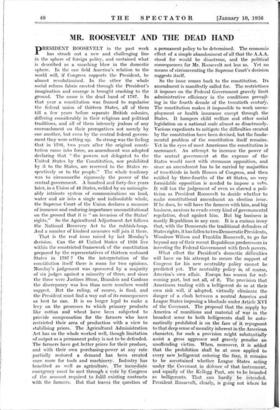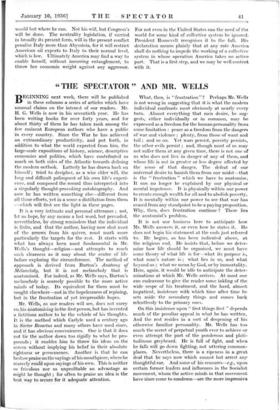MR. ROOSEVELT AND THE DEAD HAND P RESIDENT ROOSEVELT in the
past week has struck out a new and challenging line in the sphere of foreign policy, and sustained what is described as a smashing blow in the domestic sphere. In the one field America's relation to the world will, if Congress supports the President, be almost revolutionised. In the other the whole social reform fabric erected through the President's imagination and courage is brought crashing to the ground. The cause is the dead hand of 1787. In that year a constitution was framed to regularise the federal union of thirteen States, all of them till a few years before separate British colonies, differing considerably in their religious and political traditions, and all of them intensely jealous of any encroachment on their prerogatives not merely by one another, but even by the central federal govern- ment they were setting up. So strong was the feeling that in 1791, two years after the original consti- tution came into force, an amendment was adopted declaring that " the powers not delegated to the United States by the Constitution, nor prohibited by it to the States, are reserved to the States re- spectively or to the people." The whole tendency was to circumscribe rigorously the power of the central government. A hundred and forty-five years later, in a Union of 48 States, welded by an unimagin- ably intricate system of communications on land, water and air into a single and indissoluble whole, the Supreme Court of the Union declares a measure of immense and enduring importance unconstitutional on the ground that it is " an invasion of the States' rights." So the Agricultural Adjustment Act follows the National Recovery. Act to the rubbish-heap. And a number of kindred measures will join it there.
That is the real issue raised by last Monday's decision. Can the 48 United States of 1936 live within the constricted framework of the constitution prepared .by the representatives of thirteen seaboard States in 1787 ? On the interpretation of the constitution itself there is room for two opinions. Monday's judgement was sponsored by a majority of six judges against a minority of three, and since the three were Justices Stone, Brandeis and Cardozo the discrepancy was less than mere numbers would suggest. But the ruling, of course, is final, and the President must find a way out of its consequences as best he can. It is no longer legal to make a levy on the processes to which primary products like cotton and wheat have been sUbjected to • provide compensation for the farmers who have restricted their area of production' with a view to stabilising prices. . The Agricultural Administration Act has on the whole worked well, though limitation of output as a permanent policy is not to be defended. The farmers have got better prices for their produce, and with their own purchasing-power at any rate partially restored a demand has been created once more for tools and machinery. Industry has benefited as well as agricUlture. The immediate emergency must be met through a vote by Congress of the amount required to fulfil, existing_ contracts with the farmers. But that leayes the_ question of a permanent policy to be determined. The economic effect of a simple abandonment of all that the A.A.A. stood for would be disastrous, _ and the political consequences for Mr. Roosevelt not less sip. Yet no means of circumventing the Supreme Court's decision suggests itself.
So the issue comes back to the constitution. Its amendment is manifestly 'called for. The restrictions it imposes on the Federal Government gravely limit administrative efficiency in the conditions prevail- ing in the fourth decade of the twentieth century. The constitution makes it impossible to work unem- ployment or health insurance except through the States. It, hampers child welfare and other social legislation on a national scale almost as disastrously. Various expedients to mitigate the difficulties .created by the constitution have been devised, but the funda- mental problem of the constitution itself remains. Yet in the eyes of most Americans the constitution is sacrosanct. An attempt to increase the power of the central government at the expense of the States would meet with strenuous opposition, and since an amendment has to be carried by majorities of two-thirds in both Houses of Congress, and then ratified by three-fourths of the 48 States, no very formidable opposition is needed to impose a veto. It will tax the judgement of even, so :shrewd:a poli- tician as President Roosevelt to decide whether to make constitutional amendment an election issue. If he does, he will have the farmers with him, and, big business, anxious to evade every. kind of governmental regulation, dead against him. But big business is mostly Republican in any case. It is a curious irony that, with the Democrats the traditional defenders of States rights, it has fallen to two Democratic Presidents, Woodrow Wilson- and. Franklin Roosevelt;, to go. far beyond any of their recent Republican predecessors in investing the Federal Government with fresh powers.
What effect the President's donneStic difficulties will have on his attempt to secure the support of Congress for his new neutrality policy cannot. be predicted yet. The neutrality policy is, of course, America's own affair., Europe_ has reason for wel- coming part, but not , all, of it. The provision, that Americans trading with a belligerent do so at their own risk will, if adopted, virtually, eliminate the danger of a clash between a neutral America and League States imposing a blockade under ,Article XVI of the Coyenant. The proposal that the supply by America of ,munitions and material of war in the broadest sense to both belligerents shall be auto- matically prohibited is on the face of it repugnant to that deep sense of morality inherent in the .A.rnerican character, for such a provision might 'substantially assist a gross aggressor and gravely penalise an unoffending victim. When, moreover, it is added that the prohibition shall , be at _ once applied to every new belligerent. entering ilie fray it remains to be er League States acting e ascertained Whether League under the Covenant, in, defence of that instrument, and ,eqpally of the Kellogg Pact, are to be branded as belligerents. That can hardly be intended. President Roosevelt, clearly, is 'goirig not where he would but where he can. Not his will, but Congress's will be done. The neutrality legislation, if carried in broadly its present forM, will in the present conflict penalise Italy more than Abyssinia, for it will restrict American oil exports to Italy to their normal level, which is low. Ultimately America may find a way to enable herself, without incurring entanglement, to throw her economic weight against any aggressor. For not even in the United States can the need of the world for some kind of collective system be ignored. President goosevelt recognises it to the full. His declaration means plainly that at any rate America shall do nothing to impede the working of a collective system in whose operation America takes no active part. That is a first step, and we may be well content with it.











































 Previous page
Previous page